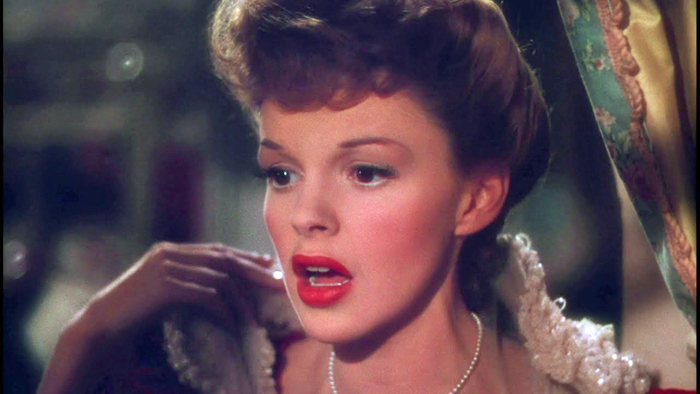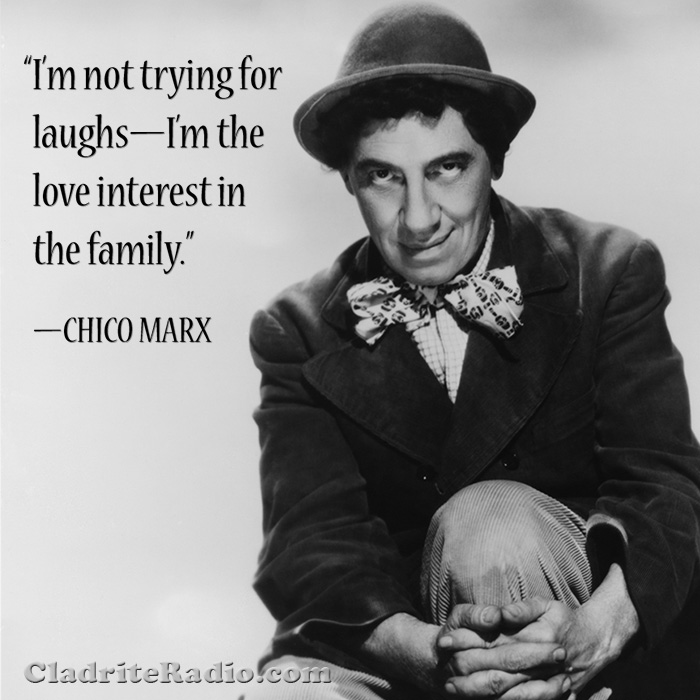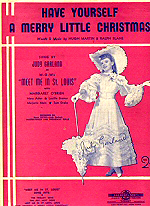Here are 10 things you should know about Chico Marx, born 136 years ago today. He enjoyed success in vaudeville, on Broadway, in pictures, on radio, in nightclubs and on television.
Tag: Mel Torme
The Twisting Path to a Merry Little Christmas
Our favorite Christmas song has long been Mel Tormé and Bob Wells’ The Christmas Song, made famous by Nat “King” Cole (and really, no one else need tackle the song—every other artist who’s taken a stab at it has fallen short, in our eyes), but coming in a close second is Have Yourself a Merry Little Christmas, credited to Hugh Martin and Ralph Blane (though Martin has since claimed he wrote it alone, with Blane’s encouragement) and introduced by Judy Garland in Vincent Minnelli‘s Meet Me in St. Louis (1944).

From its familiar opening lyrics—Chestnuts roasting on an open fire, Jack Frost nipping at your nose, yuletide carols being sung by a choir, and folks dressed up like Eskimos—The Christmas Song celebrates an idyllic holiday season, but let’s face it, for many, the holidays carry with them a tinge of melancholy—especially in difficult times like these—and Have Yourself a Merry Little Christmas openly acknowledges the bluer side of the yuletide.
In the lyrics as we know them, that melancholy is leavened by a certain “keep-your-chin-up sticktuitiveness,” but it wasn’t always so.
The first set of lyrics Martin delivered, which I found in this very informative 2007 Entertainment Weekly story by Chris Willman, were downright maudlin, intended to fit the mood of Garland’s character, who, at the point in the picture at which she sings the song, is upset that her father is moving the family from her beloved St. Louis to New York City.
The story has it that director Minnelli and Garland urged Martin to come up with something just a bit less gloomy, and he agreed, soon delivering a second set of lyrics, the ones Garland sings to young sister Margaret O’Brien in the movie.
Then, in 1957, Frank Sinatra, who was recording a Christmas album called A Jolly Christmas, asked Martin to kick the the Christmas cheer up yet another notch. He specifically asked the composer to revisit the line in the final verse about “muddling through,” and that’s how we came to have the line about hanging a shining star upon the highest bough in yet a third set of lyrics to the song.
Most folks are familiar with versions two and three—Linda Ronstadt melds the two sets of lyrics in her recording of the song—if not with the original gloomy lyrics.
But did you know Martin wrote a fourth set of lyrics? In 2001, the composer, then 86 years old, wrote an overtly religious set of lyrics to the song, entitled Have Yourself a Blessed Little Christmas.
Listen: Judy Garland—Have Yourself a Merry Little Christmas
Listen: Frank Sinatra—Have Yourself a Merry Little Christmas
This post originally appeared in slightly different form on December 10, 2010.
Happy 130th Birthday, Chico Marx!
The irrepressible Chico Marx, the eldest of the legendary Marx Brothers, was born Leonard Marx 130 years ago today in Manhattan, New York. Here are 10 CM Did-You-Knows:
- Chico’s father, Samuel Marx, emigrated to the U.S. from Alsace-Loraine; his mother, Minnie Schönberg, came over from Germany. Sam, known as Frenchie, was, according to his famous sons, NYC’s worst tailor.
- Chico was the eldest of the brothers who would go on to become world famous, but he was not the first-born of Minnie and Sam’s offspring. Their first child, a son named Manfred, died as an infant.
- Of Jewish heritage, Chico honed his Italian accent as a youth, navigating the Upper East Side’s rough-and-tough Yorkville, a neighborhood where the predominant ethnicity changed from block to block, making it advisable to be able to pass when confronted with unfriendly locals.
- For most of his life, Chico had two interests: women and gambling. As a youth, he had already become such a gambler that none of the family’s possessions were safe from the pawnshop. Frenchie frequently had to pay for the privilege of retrieving his tailor’s shears.
- Chico Marx experienced much more success as a womanizer than a gambler. Though his gambling habit left him short of money most of his life, his charming (and persistent) personality paid off royally in the area of female companionship.
- Chico was not only the eldest surviving Marx brother, he was also Minnie’s favorite. She doted on him, even paying for him to take piano lessons when money was very tight. Her investment paid off as early as his adolescence, when he was paid to tickle the ivories at silent movie theatres and in bordellos (when Chico would skip out on these gigs, his younger brother Arthur (later Harpo), who closely resembled Leonard when they were young, would often take them over, though his pianistic abilities fell well short of his older brother’s).
- Chico was the last of the four elder Marxes to join the family act; Herbert (later Zeppo), born in 1912, was much younger). Chico held a number of jobs as young man, including a song plugger gig in Philadelphia that he left to team with a singer named Aaron Gordon. They formed a vaudeville act called Marx and Gordon.
- The nickname Chico is properly spelled (and pronounced) Chicko. In May 1914, during the brothers’ vaudeville years, a monologist named Art Fisher gave them their nicknames during a backstage poker game. He was inspired to dub Leonard “Chicko” because of his penchant for chasing girls—often called “chickens” or “chicks” in those days. The brothers wouldn’t use their nicknames professionally until some years later, but after they started doing so, a typesetter omitted the K when spelling Chico’s name in a theatre program, and Chico continued to use that spelling thereafter.
- In January 1942, with the Marxes’ film career not yet over but definitely winding down and with Chico, as always, in need of money, he partnered with Ben Pollack to form a touring big band. The outfit was successful but short-lived—it broke up in July 1943, but not before having released four recordings on a pair of 78s. The band can be heard in action in a 1942 appearance on the radio program The Fitch Bandwagon. Jazz crooner Mel Torme spent time with the orchestra, serving as drummer and vocalist.
- Chico’s daughter, Maxine, did a little bit of film acting in the 1930s and went on to be a successful casting director. In 1980, she wrote an affectionate but honest memoir of life with her father entitled Growing Up with Chico.
Happy birthday, Chico Marx, wherever you may be!

We’re offering you this simple phrase…
The best Christmas song ever, hands down—though we’ve always wondered what composers Bob Wells and Mel Tormé had against 93-year-olds.
Merry Christmas to you and yours, from the late, great Nat “King” Cole and your pals at Cladrite Radio.
![]()
The Winding Path to a Merry Little Christmas
Our favorite Christmas song has long been Mel Tormé and Bob Wells’ The Christmas Song, made famous by Nat “King” Cole (and really, no one else need tackle the song—every other artist who’s taken a stab at it has fallen short, in our eyes), but coming in a close second is Have Yourself a Merry Little Christmas, credited to Hugh Martin and Ralph Blane (though Martin has since claimed he wrote it alone, with Blane’s encouragement) and introduced by Judy Garland in Vincent Minnelli‘s Meet Me in St. Louis (1944).
 From its familiar opening lyrics—Chestnuts roasting on an open fire, Jack Frost nipping at your nose, yuletide carols being sung by a choir, and folks dressed up like Eskimos—The Christmas Song celebrates an idyllic holiday season, but let’s face it, for many, the holidays carry with them a tinge of melancholy—especially in difficult times like these—and Have Yourself a Merry Little Christmas openly acknowledges the bluer side of the yuletide.
From its familiar opening lyrics—Chestnuts roasting on an open fire, Jack Frost nipping at your nose, yuletide carols being sung by a choir, and folks dressed up like Eskimos—The Christmas Song celebrates an idyllic holiday season, but let’s face it, for many, the holidays carry with them a tinge of melancholy—especially in difficult times like these—and Have Yourself a Merry Little Christmas openly acknowledges the bluer side of the yuletide.
In the lyrics as we know them, that melancholy is leavened by a certain “keep-your-chin-up sticktuitiveness,” but it wasn’t always so.
The first set of lyrics Martin delivered, which we found in this very informative 2007 Entertainment Weekly story by Chris Willman, were downright maudlin, intended to fit the mood of Garland’s character, who, at the point in the picture at which she sings the song, is upset that her father is moving the family from her beloved St. Louis to New York City.
The story has it that director Minnelli and Garland urged Martin to come up with something just a bit less gloomy, and he agreed, soon delivering a second set of lyrics, the ones Garland sings to her younger sister (Margaret O’Brien) in the movie.
Then, in 1957, Frank Sinatra, who was recording a Christmas album called A Jolly Christmas, asked Martin to kick the Christmas cheer up yet another notch, asking the composer to revisit the line in the final verse about “muddling through,” and that’s how we came to have the line about hanging a shining star upon the highest bough in yet a third set of lyrics to the song.
Most folks are familiar with versions two and three—Linda Ronstadt melds the two sets of lyrics in her recording of the song—if not with the original gloomy lyrics.
But did you know Martin wrote a fourth set of lyrics? In 2001, the composer, then 86 years old, wrote an overtly religious set of lyrics to the song, entitled Have Yourself a Blessed Little Christmas.
Listen: Judy Garland—Have Yourself a Merry Little Christmas
Listen: Frank Sinatra—Have Yourself a Merry Little Christmas
